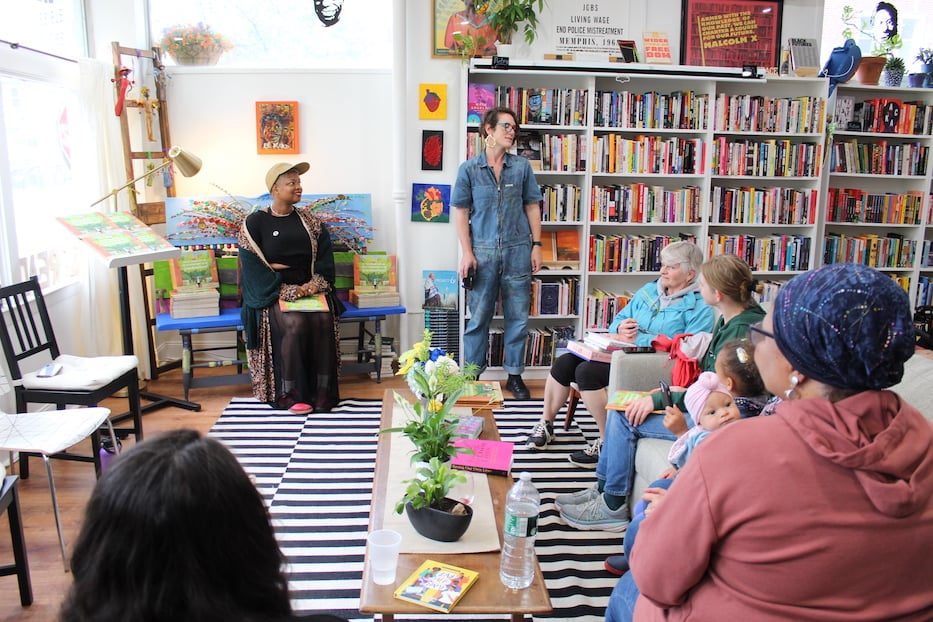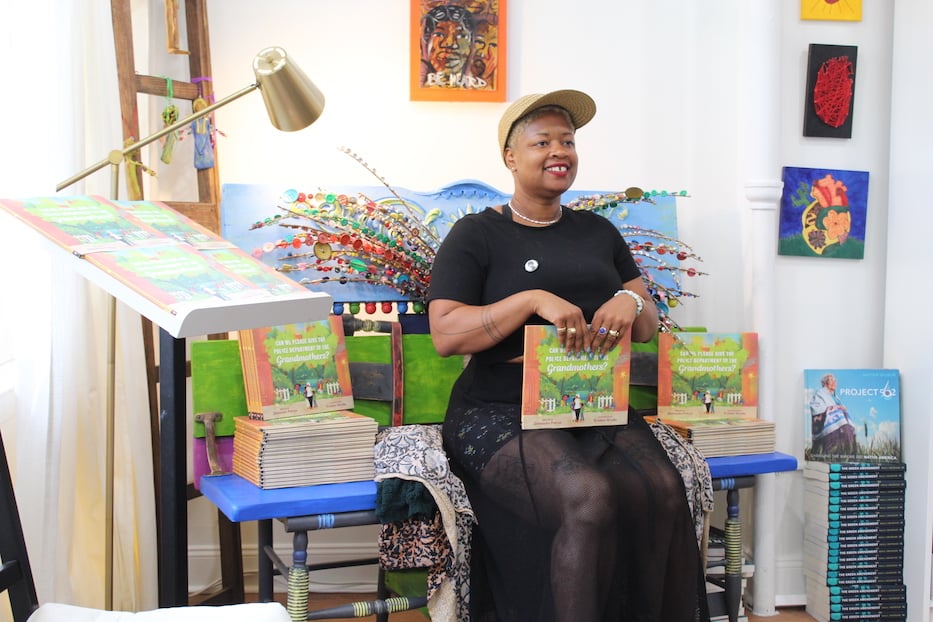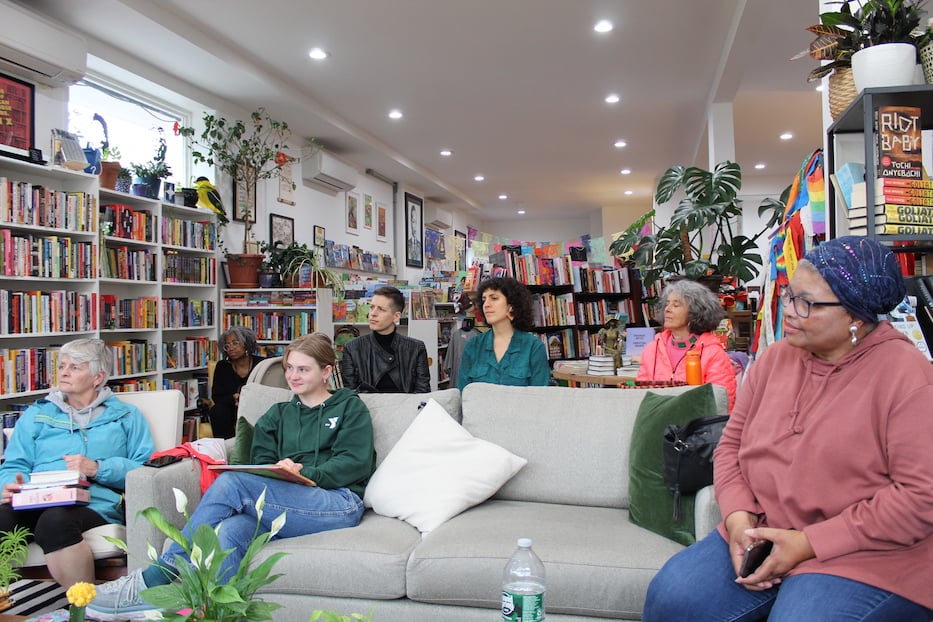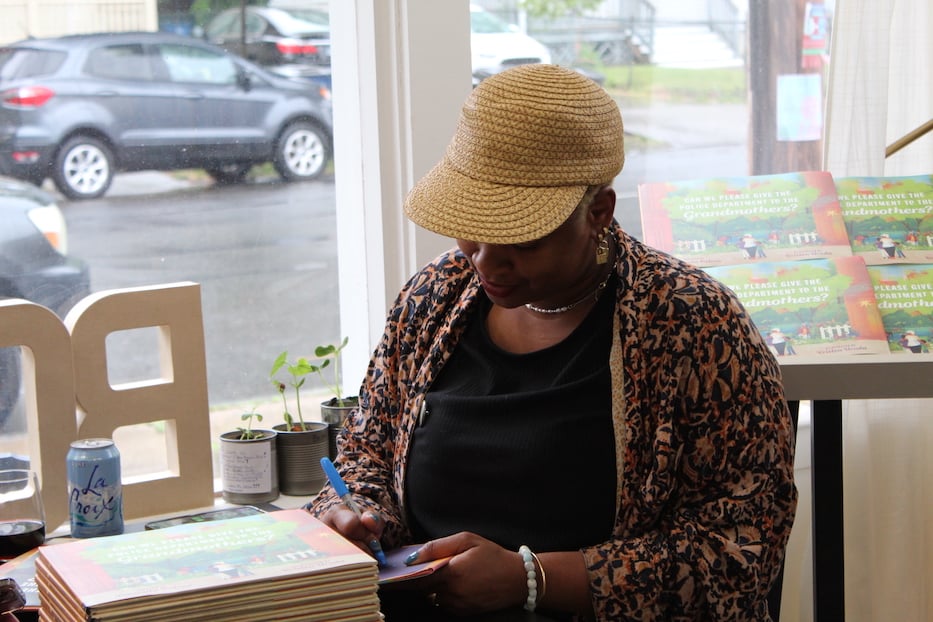
Danielle Campbell Photos.
“Can we please give the police departments to the grandmothers?”
The words floated over a crowd of people as Junauda Petrus turned a page, and ushered in the possibility of another world. Around her, attendees nodded, pulled out their phones to record, hummed murmurs of assent. At the center of it all, Petrus sat on a bench in the corner, bejeweled wings extending from behind her as she warded off the downpour outside.
Last Saturday, Petrus brought that magic to Possible Futures at 318 Edgewood Ave., as she graced the bookspace for a reading and signing of her book, Can We Please Give the Police Department to the Grandmothers? Illustrated by Kristen Uroda and based on Petrus’ spoken word poem of the same name, the book imagines a society in which grandmothers—and not members of law enforcement—are charged with a community’s public safety.
“The grandmas are the original warriors,” she read cooly, and the intimate crowd hung onto every word. “Wild since birth. Comfortable and loving fiercely. They have fought so that you don't have to. Not in the same ways at least.”

During the reading, Petrus read each stanza while showing off Uroda’s artwork. On each page, the faces were just defined enough for listeners to know what they were, but abstract and vibrant from farther away. Orange, green, and yellow tones danced across the pages. When Petrus read the words “The Grandmothers have no fear,” two grandmothers stood around a Cadillac with a few of their grown children. It was a testament to their strength, backed by dandelions that filled in the grass and represented wishes.
Before it was ever a children’s book, the poem was written after the death of Michael Brown in 2014 and went viral. It is often read after another person of color, particularly a Black man, is murdered by the police. In 2020, Petrus was living just blocks away from where an officer murdered George Floyd in Minneapolis in broad daylight. The work imagines a society where police do not exist, because grandmothers—who are often the original community caregivers—are recognized for their lifesaving and transformative work.
Petrus pushed attendees to think with her acronym for Grandma: Giving Radical Abolition Now Dreams Magically Awaken. The room stirred, attendees impressed with the feeling behind the acronym. Many asked her to repeat it so they could unpack it later on.
“I was very conscious of the ways that our society does put a lot of this extra labor on women. On elder families in particular,” Petrus said. “So how do we use the symbol of who they are as a way that all of us could show up in loving that way?”

Several attendees who had come out in the driving rain called the book a way to honor grandmothers, especially after hearing the poem. Many spoke of being inspired by their own grandmothers, and said that the poem stayed with them so close to Mother’s Day.
“Everyone here has something they can share ‘cause grandmothers are the foundation. The roof of everything. Without them you wouldn’t have gotten this far,” said community member Joseph Vidro.
As rain streaked the windows, Vidro told the story of his own grandmother. He said that she knew not only always knew when something was wrong, but also how to help.
Lauren Javier-Jones said she wants to learn how to raise her daughters to mother their community even before they become mothers. That spirit of mothering could change communities, she said.
“We all need to just treat everyone as if they are our child,” she said. “Our peers. Older or younger. If we all treated people like they were our children, the world would be [a] much better place.”

Attendees also spoke about what it would be like to see grandmothers as symbolic, rather than just an age or gender. Petrus affirmed a young man that mistakenly put his hand up when she called for the grandmothers in the room. This is where the acronym was born, she said.
Petrus also reflected on her 2014 work. She explained that she wrote and performed the poem in response to not just the officer that killed Michael Brown, but the society that believed he was a dangerous young man.
Compared to these widespread, harmful societal views of Black youth, Petrus looked to elders in the community who love and provide shelter, care and advice to the young people in their communities. She remembered an elder in Harlem who was loved and respected by the same kids New York police were afraid of. That elder is now 92 and still respected.
“There's so many times that the police just stop Black kids and create a lot of living anxiety for them,” she said. “So, I love how I would just see the space where these kids were treated like beloved human beings that were sacred.”